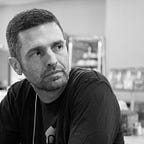Why Tonal is Truly Revolutionary
The word “revolutionary” gets thrown around a lot in the fitness world. I’ll admit that I was a bit skeptical when I first heard about the idea for Tonal, but as soon as Aly Orady gave me an early demo in 2016, I knew that I had just seen the future of strength training. The only times in the past where I felt the same brilliant and crystal clear glimpses of the future were when I first used TiVo, installed a Nest prototype at home, and touched an iPhone for the first time.
Tonal is truly revolutionary. Ask anyone who owns a Tonal. Average usage is 15 times per month, with average sessions of 40 minutes. You might think that’s due to the pandemic, but the usage statistics per machine remained roughly the same as they were pre-pandemic. It’s no surprise that NPS is in the mid-80’s. User love for Tonal is unlike anything I’ve ever seen for a hardware device. As you might expect with a product with this level of user love, sales skyrocketed by over 8x in 2020, and 2021 is off to a very strong start.
Why is Tonal such a breakthrough product? It’s the first application of digital weights, where a specialized controller was combined with an e-bike motor to emulate the behavior of a traditional weight stack. This allows for a new form factor, tight integration with personalized content, instantly changeable weight settings, and continuous measurement of user performance. Tonal closes the loop in a way that was never possible before. As a cloud service combined with hardware, they can directly measure the effectiveness of different routines and programs.
This couldn’t have happened without the right people. After spending a year perfecting the underlying digital weight technology in his kitchen at home, founder and CEO Aly Orady set about building a world-class team. Key early team members include Ryan Vance (content), Sumner Paine (product management), David Azaria (software) and Nate Bosshard (marketing). Each of them built a strong foundation for Tonal in their specific disciplines, while working closely together to build a highly integrated product. More recently, leaders like Chris Stadler (CMO) and Bryan James (CTO) have joined Tonal to apply their learnings from leading companies like Ironman, Equinox, TiVo, Apple and Nest. What makes Tonal so unique — and difficult to replicate — is the seamless integration of the machine’s hardware, software and content. It took years of effort and nearly $100 million to build a bulletproof product ready for customers. This was long before the company proved out “product market fit.”
Today Tonal announced a new $250 million round of financing. Shasta participated significantly in this round, roughly doubling our cumulative investment to date. We led the Series A round when the company consisted of less than 10 people, and we have participated in every round since then. Shasta’s investment in Tonal represents the largest investment I’ve sponsored in my career, by far, reflecting my conviction in Tonal’s team, mission, and opportunity. I believe the company has tremendous platform potential and most people still don’t fully appreciate the size and scale of the market.
